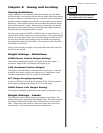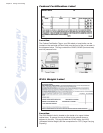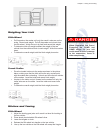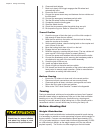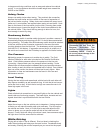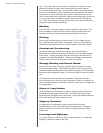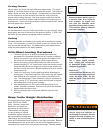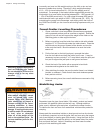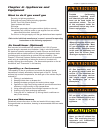
19
Chapter 4: Appliances and Equipment
Chapter 4: Appliances and
Equipment
What to do if you smell gas
Do not try to light any appliance
Extinguish any open ames including cigarettes
Do Not Touch Any Electric Switch
Open windows and doors
Exit trailer
Shut off the gas supply at the gas container (bottle or source)
Immediately call a service center or gas supplier from an outside
phone and follow their instructions
Do not turn on the gas supply until the gas leaks have been repaired
Refer to the individual manufacturer’s owner’s manual for operating
instructions on the following equipment.
Air Conditioner (Optional)
Roof mounted air conditioners are operated by an 110V AC power
source through a separate circuit breaker. Keep in mind that typically
RV electrical systems are designed to handle 30 amps and that the air
conditioner takes a sizable portion of that when the compressor starts.
(Limited product models have an optional 50 Amp capability. (See
Chapter 5, Electrical Systems) Reduce other loads as much as possible
when using air conditioning to reduce the chance of overload and
possibly tripping the main breaker. (For thermostat operation on the air
conditioner, see “Thermostat” in this section)
Capability vs. Environment
The capability of the air conditioner to maintain the desired inside
temperature is directly effected by the heat gain of the RV. During
extreme high outdoor temperatures, the heat gain of the vehicle may be
reduced by:
1. Parking in a shaded area
2. Keeping blinds down or drapes shut
3. Keeping windows and doors shut and minimize usage
4. Operation on High Fan/Cooling mode will provide the maximum
efciency in high humidity or high temperatures
5. Using awnings to block direct sunlight exposure on the unit
6. Avoiding use of heat producing appliances
7. Giving the A/C a “head start” by turning the air conditioner on
early in the morning
Care and Maintenance
Periodically remove the return air lter and wash with hot soapy water.
During extended use situations, cleaning is recommended after two weeks
of daily usage.
Portable fuel-burning
equipment, including wood
and charcoal grills and stoves,
must not be used inside the
recreational vehicle. The use
of this equipment inside the
recreational vehicle may cause
res or asphyxiation.
When refueling tow vehicle, shut
off all LP gas appliances. Most
LP gas appliances are vented
to the outside. Gasoline fumes
could enter the appliance and
ignite from the burner ame,
causing an explosion or re.
DO not store or use gasoline
or other ammable vapors and
liquids in the vicinity of any
appliance.
LP Gas containers shall not
be placed or stored inside the
vehicle. LP Gas containers are
equipped with safety devices
that relieve excess pressure
by discharging gas to the
atmosphere.
Never run the A/C without the
lter. This could plug the unit
evaporator cell, substantially
effecting performance.



